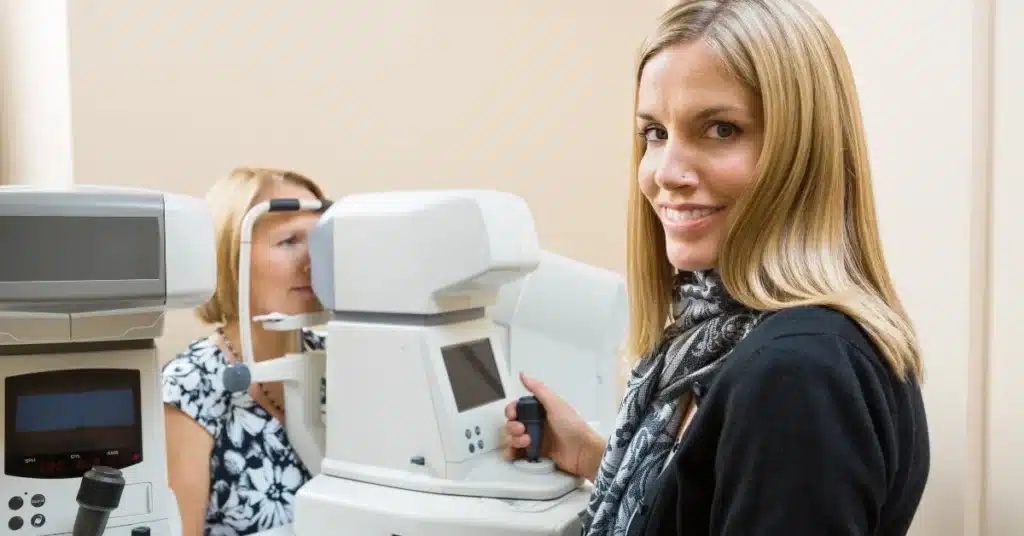Eye pain is a common sensation that can occur within or around the eye, causing discomfort or aching.
This pain can vary in intensity, ranging from mild irritation to severe throbbing or stabbing.
Eye pain can stem from various factors, such as eye strain, infections, injuries, or underlying medical conditions like Glaucoma.
If you experience frequent eye pain, seeking medical attention for a proper diagnosis and specialized care is essential.
Therefore, knowing the type of doctor you should visit for eye pain is crucial for targeted treatment.
This article discusses the types of eye specialists to consult for eye concerns and when to seek medical attention.
The type of doctor you should visit for eye pain
When experiencing eye pain, getting specialized attention from an eye care professional is critical.
Two types of doctors specialize in treating eye pain problems, including optometrists and ophthalmologists.
Optometrist
 Source: Simplefoo
Source: SimplefooOptometrists are eye care professionals trained to conduct eye examinations, diagnose vision disorders, prescribe corrective lenses, and detect certain eye conditions.
They can evaluate eye health, treat minor eye problems, and send patients to ophthalmologists if necessary.
You may visit an optometrist for mild to moderate eye pain, discomfort, or vision-related issues. They can address mild eye irritations, dry eyes, refractive errors, or eye infections.
However, if the eye discomfort persists, increases, or is accompanied by severe symptoms, it is best to consult an ophthalmologist.
They can provide more specialized care and address complex eye disorders.
Ophthalmologist
Ophthalmologists are eye care specialists who can diagnose and treat various eye disorders. They can also perform surgery, prescribe medicines, and manage complex eye ailments.
They know significantly about eye health disorders, including eye pain caused by more serious illnesses.
Seeing an ophthalmologist for eye pain is advised, especially for continuous or severe pain, vision changes, or worsening symptoms.
Recommended read: Wondering why you have eye pain? Learn why it occurs —- Common Causes of Eye Pain: All You Need to Know
When to see a doctor for eye pain
Knowing when to visit a doctor for eye pain is crucial for timely care. Recognizing which eye specialist you should visit for specific symptoms is essential.
Optometrists and ophthalmologists are the two types of doctors specializing in eye care.
When to visit an optometrist
 Source: instaphotos
Source: instaphotosRoutine eye checkups at an optometrist are essential for maintaining optimal eye health and preventing potential hazards.
It is also advisable to seek an eye examination if you wear glasses and encounter eye discomfort, as your prescription may need to be modified.
An optometrist can address eye pain and concerns related to nearsightedness, farsightedness, or astigmatism.
In addition, you should seek an initial evaluation from an optometrist if you experience the following symptoms associated with eye pain:
- Eye irritation
- Redness
- Vision changes
- Floaters
- Flashes of light
- Dryness
- Mild infections
- Swelling
When to visit an ophthalmologist
If the pain in your eye is severe and accompanied by other concerning symptoms, visiting an ophthalmologist is advisable.
These symptoms include severe or persistent pain and sudden vision changes, such as blurry or distorted vision.
These symptoms could indicate severe eye conditions, such as Glaucoma, Cataracts, or retinal disorders.
Your optometrist may refer you to an ophthalmologist after an initial eye examination if they suspect the above risks.
An ophthalmologist can aid in the management of chronic eye conditions.
Buy now: Bimat LS Eye Drop
Takeaway
Knowing the right type of doctor you should visit for eye pain is critical for prompt and successful treatment.
You can visit an optometrist for mild eye pain, irritation, infections, and refractive errors.
However, suppose you experience severe and persistent eye pain and sudden vision changes. In that case, it is advisable to see an ophthalmologist.
It is crucial to prioritize eye health by seeking professional care to achieve the best results.
Whether you need an optometrist for initial screening or an ophthalmologist for specialized treatment, getting the right assistance is essential.
Frequently Asked Questions
What if I’m unsure which specialist to visit for my eye pain?
If you’re unsure, consult an optometrist for initial evaluation. They can guide you based on your symptoms and severity or refer you to an ophthalmologist if necessary.
Can an optometrist detect serious eye diseases causing pain?
Optometrists can detect certain eye conditions during routine exams. Ophthalmologists, on the other hand, can offer specialized diagnosis and treatment for complex or severe conditions.
Are ophthalmologists only for surgical procedures?
No, ophthalmologists can also provide medical treatments beyond surgical procedures. While they can perform surgeries, they also diagnose and manage various eye conditions.
Should I visit an optometrist first if I have mild eye pain?
You should visit an optometrist initially for mild eye pain or routine eye care needs. Consulting an ophthalmologist is advisable if symptoms persist, worsen, or involve severe pain.
Can an ophthalmologist prescribe glasses or contact lenses?
Yes, ophthalmologists can prescribe corrective lenses. However, they primarily focus on detecting and managing complex eye problems beyond refractive abnormalities.
When referencing outside resources, GoodrxMedicine always provides full citations. To learn more about the measures we use to maintain the quality of our content, please review our Content Information Policy.











